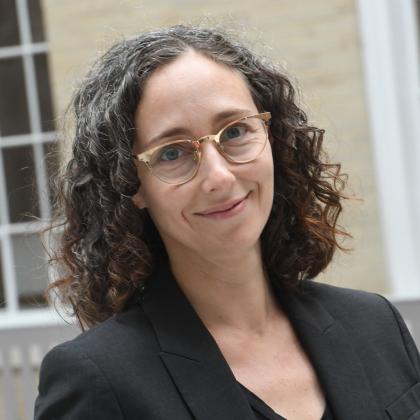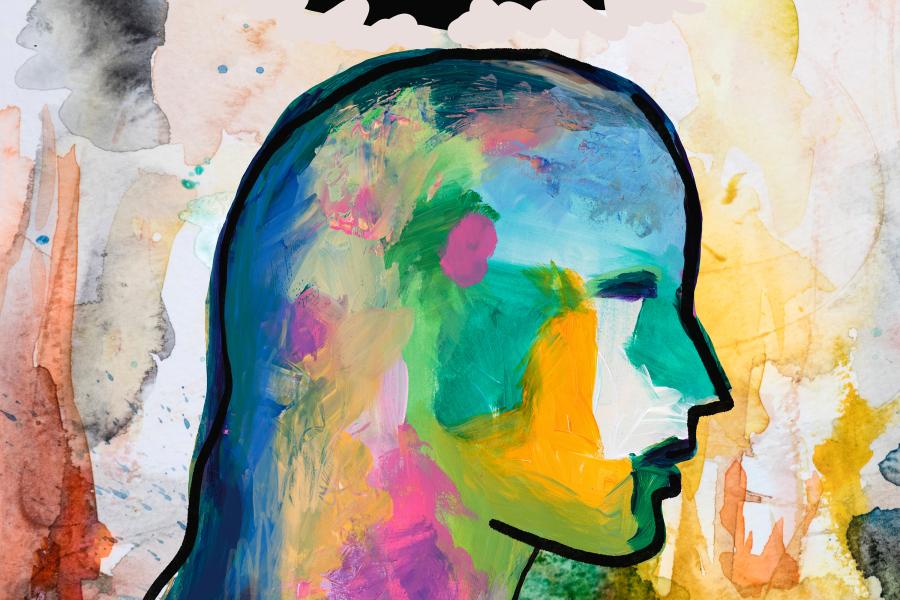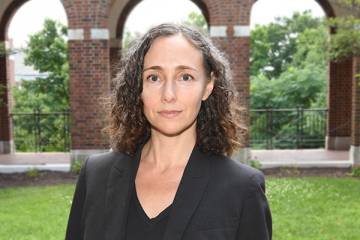It's time for America to end its black-and-white thinking about addiction and recovery, according to Johns Hopkins professor Hanna Pickard. Traditional approaches in the U.S.—framing addiction as either a moral failing or a disease of the brain—do not suffice, she says.
"Is addiction a brain disease? Cards on the table: I don't know," she admits. Regardless, she suggests, the danger of reducing addiction to only that explanation obscures other important factors—such as the psychological function and significance of drugs for those who struggle with addiction or the social and economic context of their drug use—and can also sometimes create a sense of helplessness and pessimism in patients themselves.

Image caption: "There is never one simple or easy answer for why people continue using drugs despite negative consequences in their life," says philosopher Hanna Pickard. "You'll find a range of reasons that vary with each person, each drug, and each setting."
Image credit: Jim Burger for Johns Hopkins University
Instead, Pickard, who has spent over a decade examining literature on addiction across a wide range of disciplines and perspectives to look for trends and provide analysis, now espouses the term "heterogeneity" in her research on drug addiction. No two cases of addiction are exactly alike, she says, and we should not expect one single explanation of addiction to apply universally. One virtue of this theoretical approach is that it better aligns with conventions of good clinical care—specifically tailored to each individual, respecting their own stances toward drug use and hopes for their future. "There is never one simple or easy answer for why people continue using drugs despite negative consequences in their life," Pickard says. "You'll find a range of reasons that vary with each person, each drug, and each setting."
In a recent conversation preceding National Recovery Month, Pickard spoke with the Hub about her latest thoughts on the complexities of defining and treating drug addiction in America.
"Our basic conceptualizations haven't been fully productive, and it's time for change," says Pickard, a Bloomberg Distinguished Professor of philosophy and bioethics. "And for that reason it actually feels like an extremely exciting and forward-looking time to be part of addiction research."
How do you define addiction?
A lot of my work has focused on how addiction is defined by a puzzle. Prior to developing addiction, there is no mystery as to why people use drugs. Whatever real or potential costs they bring, drugs have tremendous benefits—pleasure; relief from negative experiences like pain, stress, and emotional suffering; or the promise of new, positive experiences like social connection or spiritual transformation. By contrast, addiction is associated with heartbreaking, life-destroying costs—loss of family, friends, jobs, housing, health, and, in jurisdictions that criminalize drug possession, basic freedom. These costs seem to outweigh any benefits. This shift in balance creates the puzzle of addiction: why do people keep using drugs, given that costs outweigh benefits? I think this puzzle defines what addiction is—a form of apparent irrationality—and thereby specifies what a good theory or a serious understanding of addiction must do: namely, solve the puzzle and explain why a person keeps using drugs in face of such costs.
But defining addiction in this way raises a very difficult question. Costs and benefits can only be weighed relative to a set of values. To put the question crudely: whose values determine when drug use becomes addiction? Sometimes, there is no issue, because everyone agrees. But sometimes there can be disagreement over values between people who use drugs and families, friends, doctors, wider society, and the state. My view is that the answer to the question "Whose values?" must be: the person's own. Addiction occurs when a person's use of a drug becomes something that contravenes their own authentic values. This should be a fundamental tenet of patient-centered care: a diagnosis with addiction should not be made unless the patient themself sees their drug use as a deep problem in their life.
And yet, that's very complicated, because various psychological factors, such as denial, lack of insight, cognitive dissonance, or even just a kind of resigned hopelessness, can make it very hard to know when a person's values are truly breached by drug use. Defining addiction through the lens of that puzzle and recognizing the role that values must play in this definition is a far cry from viewing addiction as a prototypical disease that is defined and ideally diagnosed by underlying brain pathology. It is much more complicated.
Let me add just one more thing—there is a longstanding but all too often under-appreciated distinction between physical dependence and addiction. Physical dependence is neither necessary nor sufficient for addiction. It's not necessary because people can become addicted to drugs that do not produce physical withdrawal symptoms—cocaine and cannabis are standard examples. And it's not sufficient because people can be physically dependent on a drug but not addicted, because on balance drug use is making the person's life better, not worse. For example, patients who are on long-term, stable opioid prescriptions for chronic pain are certainly physically dependent. If their prescription is suddenly reduced or stopped, they will go into withdrawal. But at the same time, their prescription may be what is enabling them to function effectively and lead a fulfilling life. Something similar is true with many prescribed psychiatric drugs, like certain antidepressants or anti-psychotics. People become physically dependent on these medications, but that does not mean the person is addicted.
So physical dependence and addiction are different, which means we can't define addiction merely by appeal to physical dependence. Addiction is less about the physical, more about the mental.
What are the prevailing models for understanding addiction in the U.S., and where do you think they fall short?
Historically in American culture, there has been a somewhat puritanical streak that condemns pleasure-seeking behaviors as morally wrong, even when so many of our behaviors are exactly about seeking pleasure. As I said earlier, people do use drugs for pleasure—even if that is not the only reason people use them. This can lead to the moral condemnation of drug use and the idea that addiction must be a sign of poor moral character.

Image credit: Getty Images / Stella Levi
More recently, there has been a shift from that kind of overtly moralistic model to a brain disease model. The core thinking is that chronic, immoderate drug use causes brain pathology, which itself ultimately controls a person's behavior such that drug use becomes compulsive. In other words, once addicted, a person can't help using drugs and they have lost their freedom of will—whatever exactly that ultimately means—because their brain has been damaged, "hijacked" by drugs. The continuation of drug use in effect becomes a passive symptom of an underlying brain disease, as opposed to the kind of thing that we should try to understand and explain from more ordinary psychological, social, and economic perspectives.
It is incredibly important to combat the stigmatization and condemnation of people suffering from addiction. In this respect, some motivations behind the brain disease model are excellent, and if I had to choose between the moral model and the brain disease model, I'd choose the latter without hesitation. But I have come to believe the model is limiting despite its advantages. Luckily, we are not forced to choose between these models, and other paradigms for understanding addiction are developing. That's why it's an exciting time to be part of addiction research: things are changing.
I would like us to spend more time seriously interrogating the moralistic assumptions we make about drug use. Why exactly are some drugs characterized as "bad" (for example heroin, which is criminalized if used recreationally) while others are not (for example alcohol, which is legal and widely socially sanctioned)? And why exactly are some purposes for drugs "bad," such as for recreational pleasure, while others are not, such as for pain relief?
In addition, the focus of the brain disease model on neurobiology and underlying pathology—and not the psychological, social, and economic factors—not only constricts our ability to construct effective policies and interventions to address addiction, but also creates its own stigma, dividing people who have the disease and people who don't. They can also impede people from acknowledging that they are struggling with drugs or, if they acknowledge this, create a sense of helplessness and pessimism.
This is a more philosophical point, but I also don't think that the meaning of the concept of "disease" is yet clear, nor is the scientific evidence that addiction is a disease yet conclusive. I recently published an article making a plea not only for heterogeneity but agnosticism about the brain disease model, which is my current position.
Under the brain disease model, what is the role of medication in addiction treatment?
I don't want to say there is no scope for the brain disease model to broaden its lens, far from it. But I do think that over the past decades, it has narrowed our attention and focus, which is unfortunate. This has affected what kinds of research get funded and what kinds of treatments get prioritized. Implicitly, I suspect it has also supported the idea that the "cure" can only come from a doctor prescribing medication. To be sure, medication-assisted treatment is a vital part of effective treatment in many cases, and it should be unconditionally offered whenever it is. But there is nonetheless something disempowering about seeing the "cure" depending so much on a doctor and what they prescribe. If you are addicted, changing your relationship to drugs is often a long and complicated process that involves more than medication. It may require social support from others. It may require the opportunity for education and employment. And I think it inevitably requires tremendous resolve, commitment, self-anguish, self-reflection, sometimes even the fashioning of a new self-identity—a topic I've worked on that I think is tremendously important to understanding addiction but often goes unacknowledged.
Doctors can no doubt support patients apart from prescribing medication, and of course good doctors do this all the time, but we need to better recognize the importance of social context and economic opportunities as well as the psychological work required to recover that people must undertake for themselves. We need to expand how we think about and address addiction—here again, the emphasis should be on heterogeneity and individually tailored care.
Is there anything else you'd like to add?
If I could choose one point to make stick in the mind of everyone who works one way or other in the world of addiction, it's the need to appreciate the heterogeneity of why people with addiction use drugs and how best to help. There is no one-size-fits all explanation or intervention. There is no universal truth here—and I say that as a philosopher!
Posted in Health, Politics+Society
Tagged philosophy, addiction, hanna pickard









